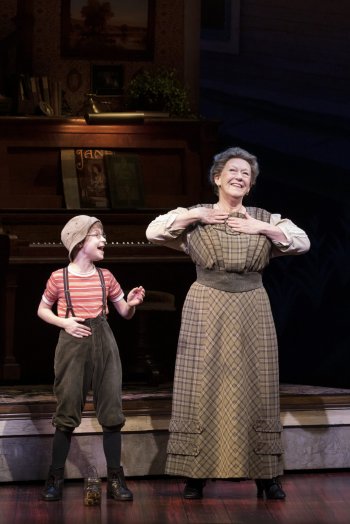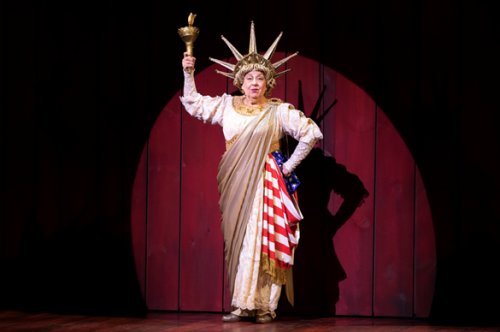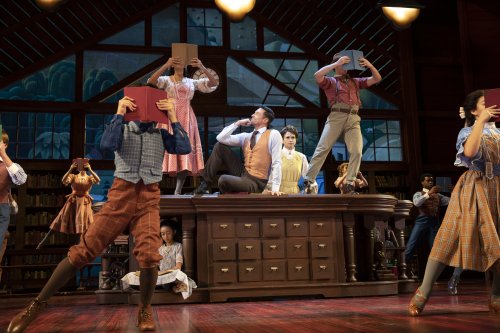The Music Man
In a new interpretation, film superstar Hugh Jackman has chosen to underplay Professor Harold Hill, making him less of a con artist and a rogue. Decide for yourself whether this successful.

Hugh Jackman as Harold Hill, Sutton Foster as Marian Paroo and cast in a scene from the new Broadway revival of Meredith Willson’s “The Music Man” now at the Winter Garden Theatre (Photo credit: Julieta Cervantes)
[avatar user=”Victor Gluck” size=”96″ align=”left”] Victor Gluck, Editor-in-Chief[/avatar]
Because of changing social mores, some Broadway musicals are assumed to make audiences uncomfortable today. Take for example Rodgers and Hammerstein’s Carousel whose protagonist is a wife-beater. The recent revival did everything in its power to mitigate this problem but did not succeed. Now we have the long awaited revival of Meredith Willson’s The Music Man starring film megastar Hugh Jackman as Professor Harold Hill and two-time Tony Award-winner Sutton Foster as Marian Paroo, the librarian and music teacher. The problem the director and producers had with this classic piece of Americana, set in 1912, is that the hero Professor Hill is a con-artist and a serial seducer with whom we are supposed to be sympathetic.
However, in 2022 this is an obstacle in an era when lovable rogues are not acceptable as heroes. As a solution, Jackman has been directed by Jerry Zaks to play Harold Hill as low-key and muted as he possibly can. What this does is straitjackets Jackman’s personal charm and charisma which he normally has in spades. The result is an undercooked Music Man even though it has been given a big, expensive production – six Tony Award winners on stage and six in the production team – maybe the starriest cast in New York right now.

Jefferson Mays as Mayor Shinn and the Barbershop Quartet (Eddie Korbich, Daniel Torres, Nicholas Ward and Phillip Boykin) in a scene from the new Broadway revival of “The Music Man” now at the Winter Garden Theatre (Photo credit: Julieta Cervantes)
There are other changes made to the text apparently for political correctness and to not offend today’s sensibilities. The program lists additional lyrics by Marc Shaiman & Scott Wittman (the team responsible for Hairspray and Catch Me If You Can). The most obvious change is the drastically rewritten version of the words to the dance number “Shipoopi.” Among the new lines are “The boy who’s seen the light! … To treat a woman right,” instead of “The girl who’s hard to get… But you can win her yet!” which is the actual plot of the show with Harold chasing the stand-offish Marian all over town, while the new lines sound too enlightened for the 1912 time period. The entire song appears to have been sanitized – in order to make this family entertainment? The original Indian dance number with Mrs. Shinn and her ladies had been dropped in favor of one in Revolutionary War costumes. (To be fair to the production, this number was also eliminated from the 1962 film version.)
Sutton Foster is a talented musical comedy star of the first magnitude with Tony Awards for both Thoroughly Modern Millie and Anything Goes, and nominations for Little Women, The Drowsy Chaperone, Shrek the Musical and Violet to prove it. However, Foster is a mezzo and Marian Paroo’s songs for The Music Man were written specifically for a lyric soprano. Her rendition of her solos, the beautiful “Goodnight, My Someone,” “My White Knight,” and “Till There Was You,” sound strained as though she were pushing her voice rather than that it comes naturally to her. This makes them less effective than they are meant to be. As the prim and proper librarian and music teacher, she has ice in her veins until she sees how her brother Winthrop reacts to his new and shiny gold cornet and then she melts instantly which seems a little too fast.

Hugh Jackman as Harold Hill and Sutton Foster as Marian Paroo in a scene from the new Broadway revival of “The Music Man” now at the Winter Garden Theatre (Photo credit: Julieta Cervantes)
For those who have not seen one of the three New York revivals or the two film versions, The Music Man is based on composer, lyricist, book writer Meredith Willson’s childhood growing up in Mason City, Iowa, when he was nine. Suggested by his 1948 memoir, And There I Stood with My Piccolo, the plot of the musical is credited to Willson and Franklin Lacey. Beginning on July 4, 1912, the story starts on a train leaving Rock City, Illinois, and passing through River City, Iowa. The traveling salesmen complain that a so-called “Professor Harold Hill” is making their profession more difficult by selling musical instruments and uniforms to gullible Midwesterners and then skipping out of town before he can create the marching bands he promises. He also uses the women music teachers to put over his scam. With that, Hill himself exits the train to try his luck in River City.
After meeting the citizens’ “special chip-on-the-shoulder attitude,” Hill discovers his old sidekick Marcellus Washburn, now gone legitimate, who tells him that a new pool table has just been delivered to the billiard parlor and that the only trained musician in town is spinster Marian Paroo, the local librarian who gives piano lessons. When Hill tries to cozy up to the prim and proper Marian, she won’t give him the time of day. Using the pool table as a pretext, Hill convinces the townspeople that they have trouble coming and that he can keep the boys “honest after school” by forming a band, and offers to sell them instruments and uniforms. Mayor Shinn who owns the billiard parlor demands that the school board get Hill’s credentials, but Hill turns them into a Barbershop quartet and the mayor’s wife and her ladies into a dance committee keeping them all busy.

Benjamin Pajak as Winthrop and Marie Mullen as Mrs. Paroo in a scene from the new Broadway revival of “The Music Man” now at the Winter Garden Theatre (Photo credit: Julieta Cervantes)
While Hill pursues sales and Marion, she is coping with her ten year old brother Winthrop who won’t talk because he lisps and who has never recovered from the death of his father two years ago. Hill is a huge success with the townspeople until salesman Charlie Cowell arrives with proof that he is a fraud, but by then he has won over the boys, particularly Winthrop and his sister Marian who has now fallen for the con artist herself. Among the now classic songs are “Rock Island,” “76 Trombones,” “Ya Got Trouble,” “Gary, Indiana,” “Lida Rose,” “Pick-a-Little, Talk-a-Little,” and “The Sadder But Wiser Girl for Me.” The score was revolutionary at the time of its premiere as many of Willson’s lyrics don’t rhyme but are rhythmic verse set to music, and grow out of the dialogue which precedes it. Many of the songs are sung a cappella.
Much of Jerry Zaks’ production team from his Bette Midler revival of Hello, Dolly! has been recreated but with less felicitous results. Warren Carlyle’s choreography to new dance arrangements by David Chase for his cast of 42 is big, loud and busy, making it difficult to know where to look at any given moment. Santo Loquasto’s sets are a mixed blessing: the large three-dimensional pieces are all backed by versions of paintings by Grant Wood, another Iowan like Willson. However, these are in a totally different style than the realistic sets and as they can be seen through windows, doors, and archways all of the time, they are very distracting. One’s eye keeps traveling up to the top to see Wood’s pictures when one should be watching what is happening on stage below. Loquasto’s many elaborate costumes seem a bit dowdy, unless this was intentional for these stubborn, close-minded Iowans, circa 1912. What should be a joyous show throughout is often flat like day old champagne.

Jayne Houdyshell as Mrs. Eulalie Mackecknie Shinn in a scene from the new Broadway revival of “The Music Man” now at the Winter Garden Theatre (Photo credit: Julieta Cervantes)
What sounds on paper like perfect casting does not always work. Jefferson Mays, that actor who is legendary for playing multiple roles in the same show (I Am My Own Wife and The Gentleman’s Guide to Love & Murder), does not get his laughs as the often tongue-tied Mayor Shinn. As his social climbing wife Eulalie Mackecknie Shinn, Jayne Houdyshell does not seem to register though she certainly tries hard enough. Shuler Hensley, who usually steals every scene he is in, is here as Hill’s sidekick and shill Marcellus Washburn also low-key and muted, just like Jackman. Best, however, is Irish-born actress Marie Mullen, returning to Broadway for the first time since her Tony Award-winning Best Actress turn in The Beauty Queen of Leenane as Marian’s irrepressible Irish mother Mrs. Paroo with her warmth and her wisdom. Equality good is Benjamin Pajak as her ten-year old son Winthrop who has the credibility and intensity that some of the other actors lack. It is almost as though many of the performers are simply trying too hard to entertain.

Hugh Jackman as Harold Hill, Sutton Foster as Marian Paroo and cast in a scene from the new Broadway revival of “The Music Man” now at the Winter Garden Theatre (Photo credit: Julieta Cervantes)
While Jackman is not a natural singer or dancer, he does have undeniable stage presence and you can’t take your eyes off of him while he is on stage. The problem with his performance is that he never seems big enough or sly enough to fill out the proportions of this con artist who believes his own spiel. As such, the show remains a big disappointment considering the amount of talent that has gone into the new production. As Meredith Wilson’s show is basically actor proof, audiences will probably eat it up even though it is not up to par. Tickets are hard to get and the audience at the performance under review gave every song and musical number a huge ovation. The minor changes throughout will probably not be noticed by any but students of the show.
The Music Man (through January 15, 2023)
Winter Garden Theatre, 1634 Broadway, between 50 – 51st Streets, in Manhattan
For tickets, call Telecharge at 212-239-6210 or visit http://www.musicmanonbroadway.com
Running time: two hours and 30 minutes including one intermission






You should be writing for The New York Times. Doesn’t Jesse Green need a partner?